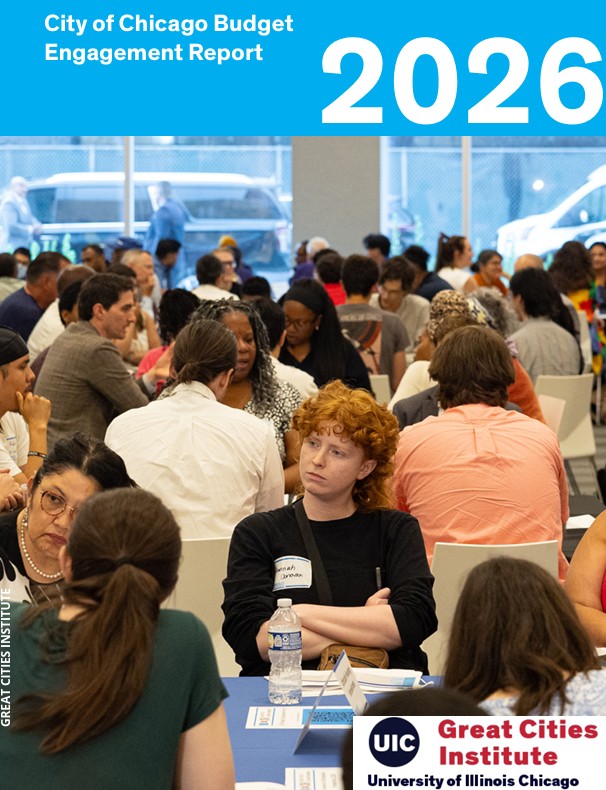Executive Summary:
Mayor Brandon Johnson will deliver his budget recommendations for the City of Chicago to the City Council today, October 16, 2025. The recommendations are informed by engagement activities conducted by the City of Chicago Office of Budget Management (OBM) and the Mayor’s Office of Community Engagement in partnership with UIC’s Neighborhoods Initiative (UICNI) at the Great Cities Institute in June and July 2025. The “City of Chicago 2026 Budget Engagement Report” documents the 2025 budget engagement process, community priorities, and reflects the complex reality facing City officials: balancing essential public services, community needs, and commitments to equity and progress during a period of heightened financial and political strain.
Activities were available both in person at three public roundtables and one youth engagement event, and online. More than 1,200 Chicago residents engaged through surveys, roundtables, and youth-specific activities. Engagement activities gathered feedback from community members on the budget, approaches to property taxes, and potential revenue sources, as well as community priorities on programs and services by issue area, and general comments regarding the budget or engagement. UICNI designed and implemented the research process, guided by principles of transparency, documenting community priorities, and analyzing both qualitative and quantitative feedback. Data sources included tabletop notes from roundtables, comment cards (paper and online), and surveys (paper and online) available in English and Spanish. In total, participants submitted 1,005 surveys and 1,157 comment cards, providing a robust mix of perspectives.
Engagement results revealed both areas of consensus and differences across groups. In public health, nearly half of both adults and youth prioritized crisis response teams (48% and 51%), signaling strong support for non-police responses to mental health crises. Adults emphasized maintaining mental health clinics (24%), while youth leaned toward prevention and wellness (23%). On youth and children’s services, adults prioritized out-of-school programming (36%) and childcare (25%), while youth emphasized employment opportunities (38%) and accessible activities (34%). For community safety, public respondents placed their highest support on violence prevention (33%), while youth prioritized justice system alternatives (26%) and support for victims and survivors (22%). In economic development, 64% of adults and 63% of youth prioritized investments in historically disinvested neighborhoods.
On environmental justice and infrastructure, adults leaned toward air pollution reduction and water system repairs, while youth favored renewable energy and clean infrastructure. For neighborhood development, adults prioritized vacant lot cleanup and reuse (42%), while youth placed greater emphasis on accessibility, digital inclusion, and simplified processes. Residents had mixed views on how to balance city service levels with property taxes; the largest share favored raising taxes to expand services. When asked about new or expanded revenue sources, respondents expressed more substantial support for options that place responsibility on corporations, institutions, or property owners rather than on individual households.
The report includes detailed results on participant demographics and analysis of community priorities and comments by topic area. Additionally, an appendix provides the full record of qualitative comments. Together, these findings illustrate a process that engaged over 1,200 residents, surfaced clear community priorities, and revealed gaps in participation for future processes to improve.
Author:
Thea Crum
Associate Director of Neighborhoods Initiative
Katherine Faydash
GCI Affiliated Researcher
Read and Download the Full Report Here.



